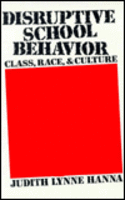
- 1988/288 pages
- Distributed for Holmes & Meier Publishers
Disruptive School Behavior:
Class, Race, and Culture
Hardcover: $39.50
ISBN: 978-084191-134-5
Paperback: $22.50
ISBN: 978-084191-164-2
Unique in its honest confrontation with real problems and its challenge to many assumptions and practices in education and public policy, this book rests on the conviction that equal opportunity in formal education is necessary but not sufficient to enable students to achieve socioeconomic success in mainstream adult life. Positive social relations as well as mutually shared values and communicative patterns are also of critical importance.
This work not only focuses on the clash of socioeconomic styles that often coincide with desegregation—an issue as relevant today as it was in the 1970s—but also offers explanations for aggressive and other disruptive school behavior based on research in the social/behavioral sciences and humanities. The author then presents coping strategies for parents, teachers, government, the private sector, and concerned citizens.
Hanna shows that without considering the unintended consequences of their programs, policy planners have unwittingly set in motion obstacles to educational achievement. Drawing upon students' own perceptions and actions, Hanna uses her case study of a court-ordered magnet school in Dallas, TX to illuminate widespread problems on a national scale.
This work not only focuses on the clash of socioeconomic styles that often coincide with desegregation—an issue as relevant today as it was in the 1970s—but also offers explanations for aggressive and other disruptive school behavior based on research in the social/behavioral sciences and humanities. The author then presents coping strategies for parents, teachers, government, the private sector, and concerned citizens.
Hanna shows that without considering the unintended consequences of their programs, policy planners have unwittingly set in motion obstacles to educational achievement. Drawing upon students' own perceptions and actions, Hanna uses her case study of a court-ordered magnet school in Dallas, TX to illuminate widespread problems on a national scale.







